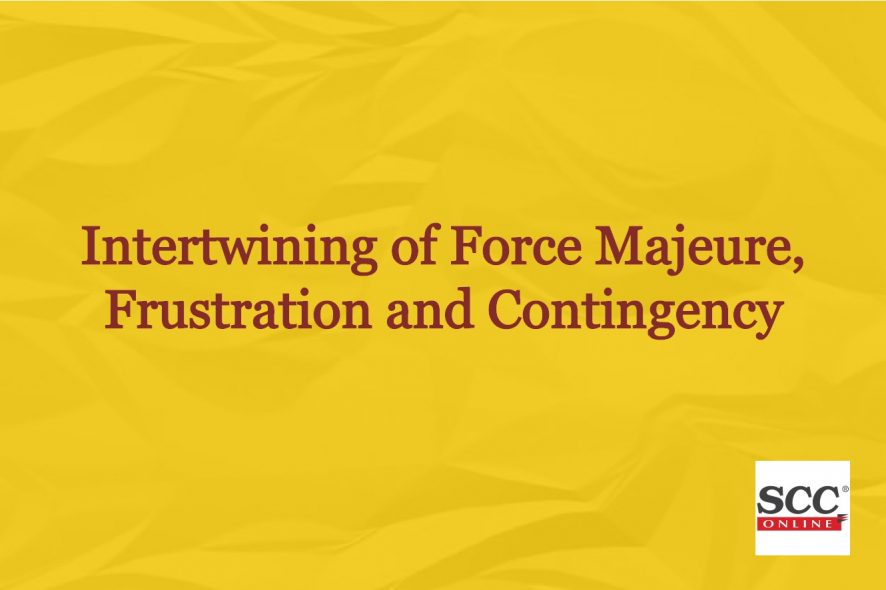Swiftness of the Coronavirus induced disruptions surely would have prevented any viable pre-preparation on part of those most affected. Resultantly, almost all businesses/industries/manufacturing units are likely to, as many already do, face unprecedented upheavals and alterations in their supply chains/workforce/expansion. It is in this background that industrial and manufacturing units, regardless of functioning via a written agreement or not, must prime themselves vis-à-vis the laws of frustration, contingency and force majeure.
In India, the law pertaining to contingency[1] and frustration[2] must be treated as rules of positive law that oblige and outline specific rights and obligations thereof. On the other hand, force majeure is a derivation of civil law, particularly French Law, whereby it pertains to any supervening event or happenstance as may obviate and affect the ability of a party to the agreement from performing it. In India, ‘force majeure’ usually finds place in a contract thereby allowing for a certain degree of flexibility and play in contractual relations thereof. Though a lot is dependent on the actual language and construction of the said clause, the courts in India have leaned in favour of placing ‘force majeure’ within the umbrella of contingency.
The courts have in their wisdom expounded upon force majeure as an exclusionary clause being part of a mutual agreement between parties thereof. In such a scenario, operation of such a clause is to be found under, and has been limited to (albeit incorrectly as per me), the chapter dealing with ‘contingency’ rather than ‘frustration’.[3] It is conceded that the presence of a ‘force majeure’ clause clearly postulates that the parties were in the know of an event or several events (being exclusively a function of that particular clause) and agreed upon the same so as to render the agreement non-performable thereof. Contingency in a contract rests on (1) agreement between parties, (2) postulated upon a future uncertain event(s)/condition(s), (3) being collateral to the contract thereof, and (4) happening (or not) of such event/condition.[4] Therefore, having regard to the same, one would be hard-pressed to disagree with the law as laid down in the seminal judgment of Satyabrata Ghose v. Mugneeram Bangur and Co. [5] when it adjudges that:
“In cases, therefore, where the Court gathers as a matter of construction that the contract itself contained impliedly or expressly a term, according to which it would stand discharged on the happening of certain circumstances the dissolution of the contract would take place under the terms of the contract itself and such cases would be outside the purview of Section 56 altogether….In such a scenario it would be a derivative of Section 32.”
Though the Supreme Court has labelled ‘force majeure’ as a function of contingency, it is my submission that in essence such a clause is ex abundati cautela and in that it traverses the thin grey area between contingency and frustration. Furthermore, it has authoritatively been held that the presence of such a clause as specifies conditionalities vide which parties would stand discharged of their contractual obligations dispenses with application of the positive law rule enshrined in Section 56.[6] However, this is where I stand in disagreement with the law as laid down in Satyabrata Ghose (1954) and followed thereafter in Energy Watchdog (2017).
In effect, both the judgments as cited herein above have given primacy to the rule of construction premised on ‘intention of parties’ whereby, regardless of Section 56, a party may agree (albeit devoid of any undue influence and coercion) to honour a contract despite occurrence of circumstances as may fundamentally alter its scape; effectively allowing the contracting parties to override a statutory enactment in going ahead with their commitment despite disappearance/obliteration/fundamental alteration of the very object thereof. Surely such a construction leads to an anomalous situation whereby the statutory scope of ‘subsequent impossibility’ is smothered.
Take for instance Illustration (e) to Section 56 as per the Act, 1872;
“(e) A contracts to act at a theatre for six months in consideration of a sum paid in advance by B. On several occasion A is to ill to act. The contract to act on those occasions becomes void.”
Evidently, as per this illustration, A’s illness is considered to be serious enough such as to excuse performance on the basis that it fundamentally alters the object of the said contract. Collating the said illustration to the situation prevailing currently whereby say ‘A’ is suffering from COVID-19 induced illness and is mandated by policy to isolate and quarantine for a certain time period. In this background, suppose the contract between ‘A’ and ‘B’ consists of a ‘force majeure’ clause such as to exclude an illness from rendering the contract void. As per the law contained in the above cited judgments, said clause would override Section 56 impossibility and despite the COVID-19 induced SARI, ‘A’ would be held liable to for breach.
The above approach, albeit in accordance with the law as at present, is not in harmony with public policy in such aberrant times. On the other hand it may be worth considering that if ‘A’ can prove that COVID-19 fundamentally prevents him/her from carrying out the object of the contract, then the lower threshold of the ‘force majeure’ clause must fall through in the face of an express statutory obligation and frustration induced discharge ought to follow. In conclusion, having regard to the above noted averment, ‘force majeure’ cannot and must not be treated as solely a function of contingency simply because of the argument resting on intention of parties and ensuing foreseeability (or not) of the event thereof.
*Author is a practising Advocate in Delhi
[1] See Chapter III, Contract Act, 1872
[2] See Chapter IV, Contract Act, 1872
[3] Energy Watchdog v. CERC , (2017) 14 SCC 80
[6] Satyabrata Ghose v. Mugneeram Bangur and Co., 1954 SCR 310; followed thereafter in Energy Watchdog v. Central Electricity Regulatory Commission , (2017) 14 SCC 80






